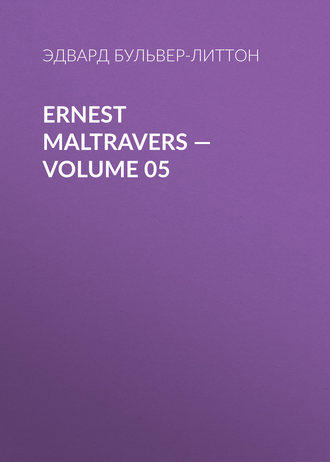
Эдвард Бульвер-Литтон
Ernest Maltravers — Volume 05
And what was the conversation carried on in that chamber? We must return to Ernest. He was sitting in the same thoughtful posture when Madame de Ventadour returned.
The Frenchwoman coloured when she found herself alone with Ernest, and Ernest himself was not at his ease.
"Herbert has gone home to order the carriage, and Lord Doningdale has disappeared, I scarce know whither. You do not, I trust, feel the worse for the rain?"
"No," said Valerie.
"Shall you have any commands in London?" asked Maltravers; "I return to town to-morrow."
"So soon!" and Valerie sighed. "Ah!" she added, after a pause, "we shall not meet again for years, perhaps. Monsieur de Ventadour is to be appointed ambassador to the Court and so—and so—. Well, it is no matter. What has become of the friendship we once swore to each other?"
"It is here," said Maltravers, laying his hand on his heart. "Here, at least, lies the half of that friendship which was my charge; and more than friendship, Valerie de Ventadour—respect—admiration—gratitude. At a time of life when passion and fancy, most strong, might have left me an idle and worthless voluptuary, you convinced me that the world has virtue, and that woman is too noble to be our toy—the idol of to-day, the victim of to-morrow. Your influence, Valerie, left me a more thoughtful man—I hope a better one."
"Oh!" said Madame de Ventadour, strongly affected; "I bless you for what you tell me: you cannot know—you cannot guess how sweet it is to me.
Now I recognise you once more. What—what did my resolution cost me?
Now I am repaid!"
Ernest was moved by her emotion, and by his own remembrances; he took her hand, and pressing it with frank and respectful tenderness—"I did not think, Valerie," said he, "when I reviewed the past, I did not think that you loved me—I was not vain enough for that; but, if so, how much is your character raised in my eyes—how provident, how wise your virtue! Happier and better for both, our present feelings, each to each, than if we had indulged a brief and guilty dream of passion, at war with all that leaves passion without remorse, and bliss without alloy. Now—"
"Now," interrupted Valerie, quickly, and fixing on him her dark eyes—"now you love me no longer! Yet it is better so. Well, I will go back to my cold and cheerless state of life, and forget once more that Heaven endowed me with a heart!"
"Ah, Valerie! esteemed, revered, still beloved, not indeed with the fires of old, but with a deep, undying, and holy tenderness, speak not thus to me. Let me not believe you unhappy; let me think that, wise, sagacious, brilliant as you are, you have employed your gifts to reconcile yourself to a common lot. Still let me look up to you when I would despise the circles in which you live, and say: 'On that pedestal an altar is yet placed, to which the heart may bring the offerings of the soul.'"
"It is in vain—in vain that I struggle," said Valerie, half-choked with emotion, and clasping her hands passionately. "Ernest, I love you still—I am wretched to think you love me no more: I would give you nothing—yet I exact all; my youth is going—my beauty dimmed—my very intellect is dulled by the life I lead; and yet I ask from you that which your young heart once felt for me. Despise me, Maltravers, I am not what I seemed—I am a hypocrite—despise me."
"No," said Ernest, again possessing himself of her hand, and falling on his knee by her side. "No, never-to-be-forgotten, ever-to-be-honoured Valerie, hear me." As he spoke, he kissed the hand he held; with the other, Valerie covered her face and wept bitterly, but in silence. Ernest paused till the burst of her feelings had subsided, her hand still in his—still warmed by his kisses—kisses as pure as cavalier ever impressed on the hand of his queen.
At this time, the door communicating with the next room gently opened. A fair form—a form fairer and younger than that of Valerie de Ventadour—entered the apartment; the silence had deceived her—she believed that Maltravers was alone. She had entered with her heart upon her lips; love, sanguine, hopeful love, in every vein, in every thought—she had entered dreaming that across that threshold life would dawn upon her afresh—that all would be once more as it had been, when the common air was rapture. Thus she entered; and now she stood spell-bound, terror-stricken, pale as death—life turned to stone—youth—hope—bliss were for ever over to her! Ernest kneeling to another was all she saw! For this had she been faithful and true amidst storm and desolation; for this had she hoped—dreamed—lived. They did not note her; she was unseen—unheard. And Ernest, who would have gone barefoot to the end of the earth to find her, was in the very room with her, and knew it not!
"Call me again /beloved/!" said Valerie, very softly.
"Beloved Valerie, hear me."
These words were enough for the listener; she turned noiselessly away: humble as that heart was, it was proud. The door closed on her—she had obtained the wish of her whole being—Heaven had heard her prayer—she had once more seen the lover of her youth; and thenceforth all was night and darkness to her. What matter what became of her? One moment, what an effect it produces upon years!—ONE MOMENT!—virtue, crime, glory, shame, woe, rapture, rest upon moments! Death itself is but a moment, yet Eternity is its successor!
"Hear me!" continued Ernest, unconscious of what had passed—" hear me; let us be what human nature and worldly forms seldom allow those of opposite sexes to be—friends to each other, and to virtue also—friends through time and absence—friends through all the vicissitudes of life—friends on whose affection shame and remorse never cast a shade—friends who are to meet hereafter! Oh! there is no attachment so true, no tie so holy, as that which is founded on the old chivalry of loyalty and honour; and which is what love would be, if the heart and the soul were unadulterated by clay."
There was in Ernest's countenance an expression so noble, in his voice a tone so thrilling, that Valerie was brought back at once to the nature which a momentary weakness had subdued. She looked at him with an admiring and grateful gaze, and then said, in a calm but low voice, "Ernest, I understand you; yes, your friendship is dearer to me than love."
At this time they heard the voice of Lord Doningdale on the stairs. Valerie turned away. Maltravers, as he rose, extended his hand; she pressed it warmly, and the spell was broken, the temptation conquered, the ordeal passed. While Lord Doningdale entered the room, the carriage, with Herbert in it, drove to the door. In a few minutes the little party were within the vehicle. As they drove away, the hostlers were harnessing the horses to the dark green travelling-carriage. From the window, a sad and straining eye gazed upon the gayer equipage of the peer—that eye which Maltravers would have given his whole fortune to meet again. But he did not look up; and Alice Darvil turned away, and her fate was fixed!
CHAPTER XI
"Strange fits of passion I have known.
And I will dare to tell."
—WORDSWORTH.
"* * * * * The food of hope
Is meditated action."
—WORDSWORTH.
MALTRAVERS left Doningdale the next day. He had no further conversation with Valerie; but when he took leave of her, she placed in his hand a letter, which he read as he rode slowly through the beech avenues of the park. Translated, it ran thus:
"Others would despise me for the weakness I showed—but you will not! It is the sole weakness of a life. None can know what I have passed through—what hours of dejection and gloom. I, whom so many envy! Better to have been a peasant girl, with love, than a queen whose life is but a dull mechanism. You, Maltravers, I never forgot in absence; and your image made yet more wearisome and trite the things around me. Years passed, and your name was suddenly on men's lips. I heard of you wherever I went—I could not shut you from me. Your fame was as if you were conversing by my side. We met at last, suddenly and unexpectedly. I saw that you loved me no more, and that thought conquered all my resolves: anguish subdues the nerves of the mind as sickness those of the body. And thus I forgot, and humbled, and might have undone myself. Juster and better thoughts are once more awakened within me, and when we meet again I shall be worthy of your respect. I see how dangerous are that luxury of thought, that sin of discontent which I indulged. I go back to life, resolved to vanquish all that can interfere with its claims and duties. Heaven guide and preserve you, Ernest. Think of me as one whom you will not blush to have loved—whom you will not blush hereafter to present to your wife. With so much that is soft, as well as great within you, you were not formed like me—to be alone.
"FAREWELL!"
Maltravers read, and re-read this letter; and when he reached his home, he placed it carefully amongst the things he most valued. A lock of Alice's hair lay beside it—he did not think that either was dishonoured by the contact.
With an effort, he turned himself once more to those stern yet high connections which literature makes with real life. Perhaps there was a certain restlessness in his heart which induced him ever to occupy his mind. That was one of the busiest years of his life—the one in which he did most to sharpen jealousy and confirm fame.
CHAPTER XII
"In effect he entered my apartment."
—/Gil Blas/.
"'I am surprised,' said he, 'at the caprice of Fortune, who sometimes delights in loading an execrable author with favours, whilst she leaves good writers to perish for want.'"
—/Gil Blas/.
IT was just twelve months after his last interview with Valerie, and Madame de Ventadour had long since quitted England, when one morning, as Maltravers sat alone in his study, Castruccio Cesarini was announced.
"Ah, my dear Castruccio, how are you?" cried Maltravers, eagerly, as the opening door presented the form of the Italian.
"Sir," said Castruccio, with great stiffness, and speaking in French, which was his wont when he meant to be distant—"sir, I do not come to renew our former acquaintance—you are a great man [here a bitter sneer], I an obscure one [here Castruccio drew himself up]—I only come to discharge a debt to you which I find I have incurred."
"What tone is this, Castruccio; and what debt do you speak of?"
"On my arrival in town yesterday," said the poet solemnly, "I went to the man whom you deputed some years since to publish my little volume, to demand an account of its success; and I found that it had cost one hundred and twenty pounds, deducting the sale of forty-nine copies which had been sold. /Your/ books sell some thousands, I am told. It is well contrived—mine fell still-born, no pains were taken with it—no matter—[a wave of the hand]. You discharged this debt, I repay you: there is a cheque for the money. Sir, I have done! I wish you a good day, and health to enjoy /your/ reputation."
"Why, Cesarini, this is folly."
"Sir—"
"Yes, it is folly; for there is no folly equal to that of throwing away friendship in a world where friendship is so rare. You insinuate that I am to blame for any neglect which your work experienced. Your publisher can tell you that I was more anxious about your book than I have ever been about my own."
"And the proof is that forty-nine copies were sold!"
"Sit down, Castruccio; sit down, and listen to reason;" and Maltravers proceeded to explain, and soothe, and console. He reminded the poor poet that his verses were written in a foreign tongue—that even English poets of great fame enjoyed but a limited sale for their works—that it was impossible to make the avaricious public purchase what the stupid public would not take an interest in—in short, he used all those arguments which naturally suggested themselves as best calculated to convince and soften Castruccio; and he did this with so much evident sympathy and kindness, that at length the Italian could no longer justify his own resentment. A reconciliation took place, sincere on the part of Maltravers, hollow on the part of Cesarini; for the disappointed author could not forgive the successful one.
"And how long shall you stay in London?"
"Some months."
"Send for your luggage, and be my guest."
"No; I have taken lodgings that suit me. I am formed for solitude."
"While you stay here, you will, however, go into the world."
"Yes, I have some letters of introduction, and I hear that the English can honour merit, even in an Italian."
"You hear the truth, and it will amuse you, at least, to see our eminent men. They will receive you most hospitably. Let me assist you as a cicerone."
"Oh, your /valuable/ time!"
"Is at your disposal: but where are you going?"
"It is Sunday, and I have had my curiosity excited to hear a celebrated preacher—Mr. ———, who they tell me, is now more talked of than /any author/ in London."
"They tell you truly—I will go with you—I myself have not yet heard him, but proposed to do so this very day."
"Are you not jealous of a man so much spoken of?"
"Jealous!—why, I never set up for a popular preacher!—/ce n'est pas mon metier/."
"If I were a /successful/ author, I should be jealous if the dancing-dogs were talked of."
"No, my dear Cesarini, I am sure you would not. You are a little irritated at present by natural disappointment; but the man who has as much success as he deserves is never morbidly jealous, even of a rival in his own line. Want of success sours us; but a little sunshine smiles away the vapours. Come, we have no time to lose."
Maltravers took his hat, and the two young men bent their way to ——— Chapel. Cesarini still retained the singular fashion of his dress, though it was now made of handsomer materials, and worn with more coxcombry and pretension. He had much improved in person—had been admired in Paris, and told that he looked like a man of genius—and, with his black ringlets flowing over his shoulders, his long moustache, his broad Spanish-shaped hat, and eccentric garb, he certainly did not look like other people. He smiled with contempt at the plain dress of his companion. "I see," said he, "that you follow the fashion, and look as if you passed your life with /elegans/ instead of students. I wonder you condescend to such trifles as fashionably-shaped hats and coats."
"It would be worse trifling to set up for originality in hats and coats, at least in sober England. I was born a gentleman, and I dress my outward frame like others of my order. Because I am a writer, why should I affect to be different from other men?"







